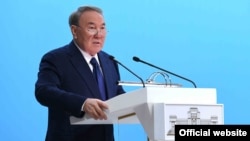Kazakh lawmakers give initial approval to constitutional changes
| Publisher | Radio Free Europe/Radio Liberty |
| Publication Date | 3 March 2017 |
| Cite as | Radio Free Europe/Radio Liberty, Kazakh lawmakers give initial approval to constitutional changes, 3 March 2017, available at: https://www.refworld.org/docid/5975a5d6f.html [accessed 15 October 2022] |
| Disclaimer | This is not a UNHCR publication. UNHCR is not responsible for, nor does it necessarily endorse, its content. Any views expressed are solely those of the author or publisher and do not necessarily reflect those of UNHCR, the United Nations or its Member States. |
March 03, 2017
 Many suspect the changes are being made to streamline the transition from Kazakh President Nursultan Nazarbaev.
Many suspect the changes are being made to streamline the transition from Kazakh President Nursultan Nazarbaev.
Kazakhstan's parliament has given preliminary approval to legislation that would amend the Central Asian country's constitution, curtailing some presidential powers and redistributing them to government ministers and lawmakers.
President Nursultan Nazarbaev, who has endorsed the changes, must also sign the amendments once they pass a second and final reading, which may come as early as March 6.
The 76-year-old Nazarbaev, the only communist-era leader who still holds power in a former Soviet republic, proposed amending the constitution to give government ministers more power and responsibilities to manage social and economic development in oil-rich Kazakhstan.
He has said parliament's control over the government would be increased through the amendments, by giving lawmakers the authority to hold a "vote of no confidence" on a sitting cabinet.
The moves have spurred speculation that they may be aimed at facilitating an eventual political transition.
Devolving some presidential powers would make it easier for Kazakhstan's political elite to manage a succession by splitting key roles between different figures rather than allowing one successor to concentrate power in his or her hands.
When he announced plans for the changes on January 25, he said the president's role would become that of a "supreme arbiter."
With reporting by Reuters
Link to original story on RFE/RL website
